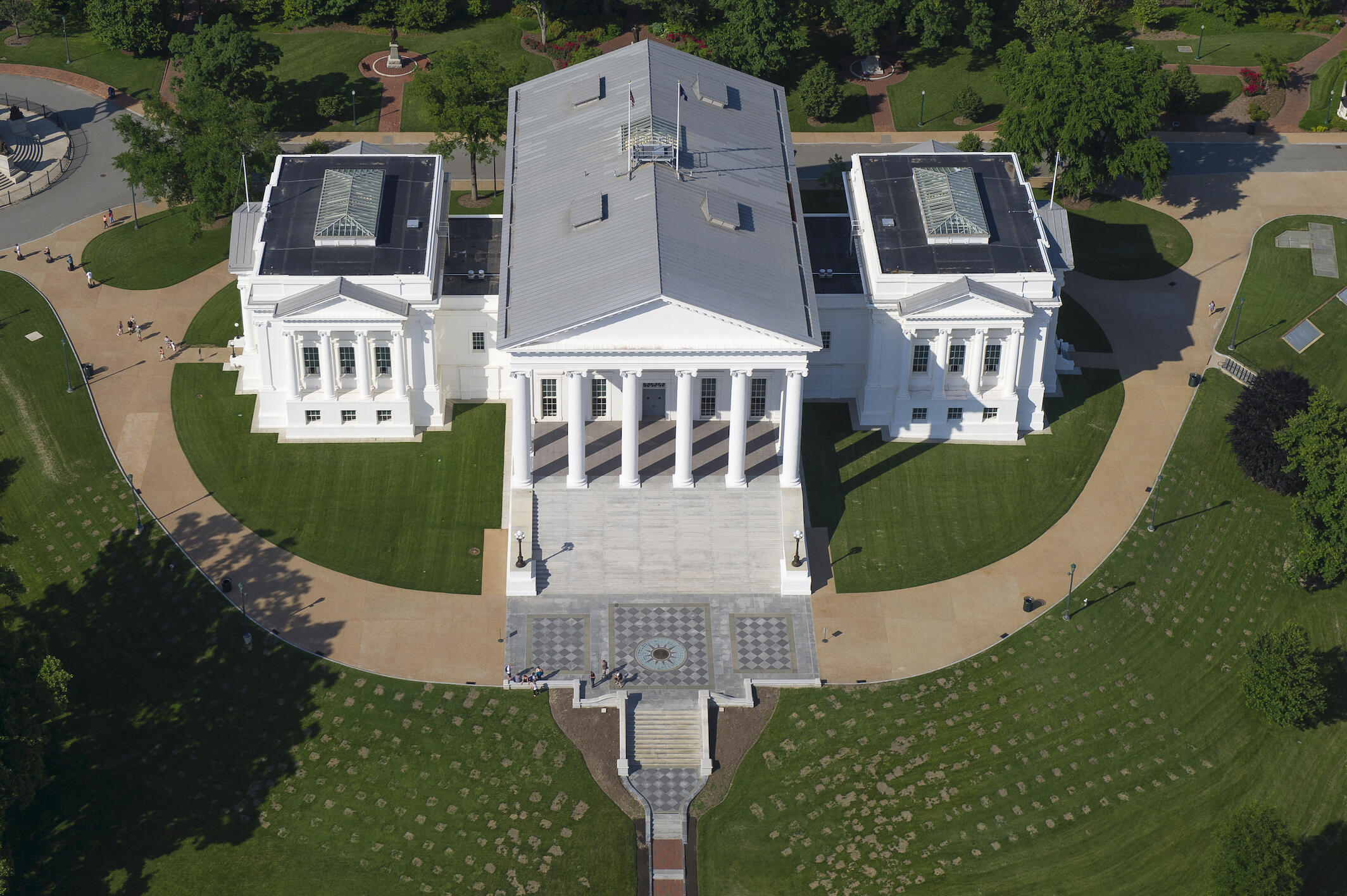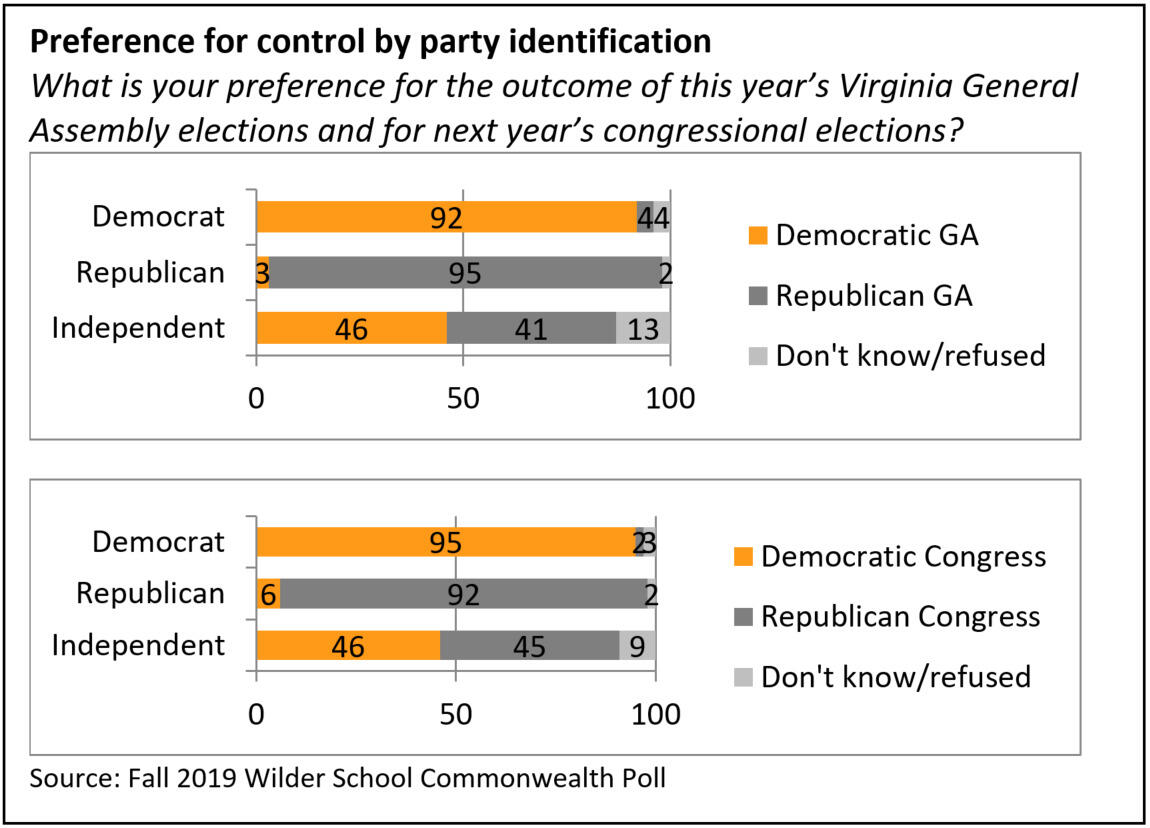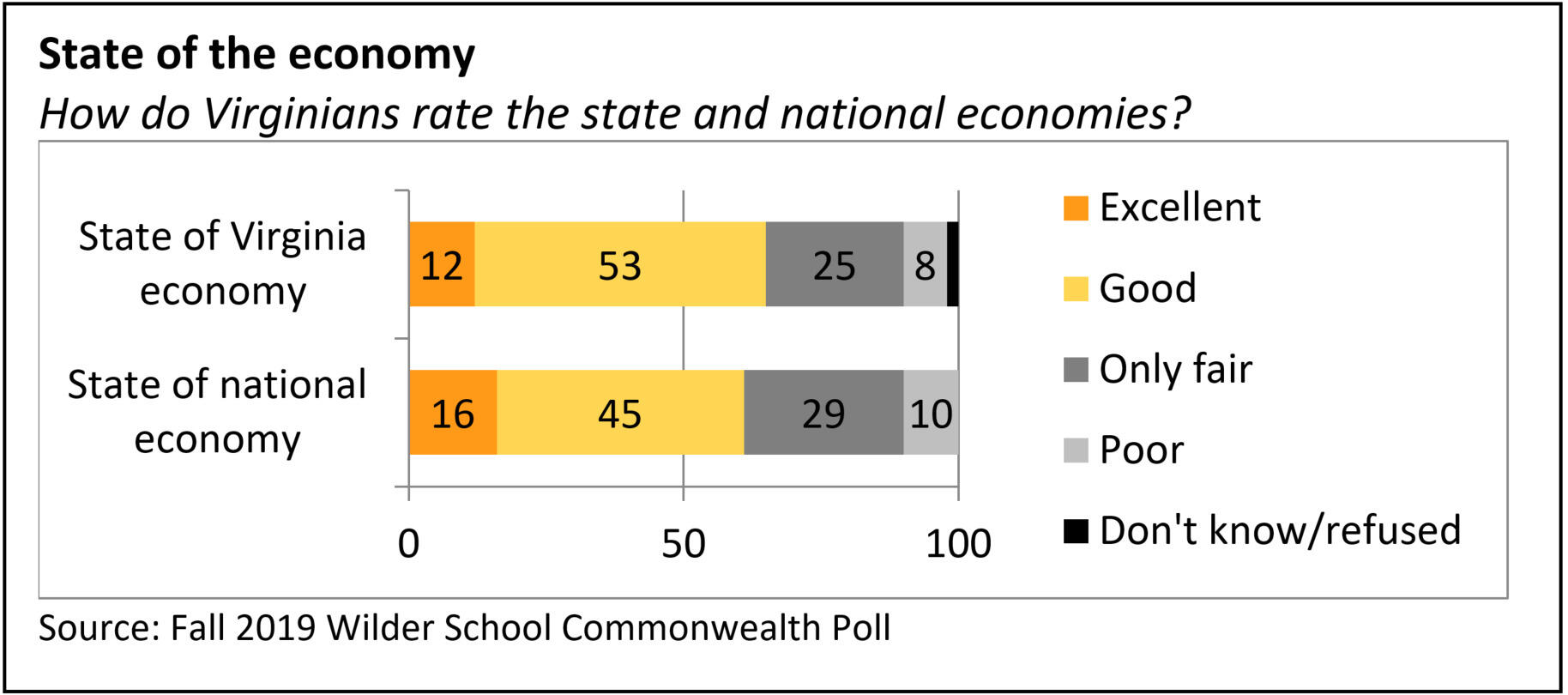
Oct. 23, 2019
Virginia independents show a preference for Democratic control of the General Assembly
Share this story
Contacts:
Angelica Bega
Executive assistant to L. Douglas Wilder
(804) 828-8520 or aebega@vcu.edu
Farrah Stone, Ph.D.
Poll Director
(804) 305-3447
stonefn@vcu.edu
With every seat in the Virginia General Assembly up for election on Nov. 5, Virginians are almost evenly split when asked which party they would prefer to have control of the state legislature. However, independents show a clearer preference for Democratic control, according to a new poll released Wednesday by the L. Douglas Wilder School of Government and Public Affairs at Virginia Commonwealth University.
The poll, conducted by landline and cellphone from Sept. 23 to Oct. 4, is based on a random sample of 800 adults in Virginia with an overall margin of error of 4.08 percentage points.
When asked about party control of the General Assembly, 47% of respondents preferred Democrats and 46% preferred Republicans. When asked the same about Congress, 49% preferred Democrats and 46% preferred Republicans.
Partisan loyalty was strong in both cases with more than 9-in-10 of both Republicans and Democrats preferring control by their own party. However, independents were almost evenly split, with a slight preference for Democrats controlling Congress (46%) and the General Assembly (46%), compared to a Republican-controlled Congress (45%) and General Assembly (41%). Independents also contained a higher percentage of don’t knows (9% for control of Congress, 13% for control of the General Assembly).
Those in Northern Virginia and the Tidewater region were more likely to prefer Democratic control of the General Assembly, with 58% and 53% respectively, while those in the Northwest and West were more likely to favor Republican control, with 61% each. The South Central region was fairly evenly split, with 48% favoring Democratic control and 45% favoring Republican control. Women, minorities and those with a college degree were more likely to prefer Democratic control of both the General Assembly and Congress.
“The poll numbers are indicators of which issues are important to the voters. The issues of health, education, crime, equity and inclusiveness that are pervasive in the everyday lives of voters seem to be more important than party affiliation,” said L. Douglas Wilder, distinguished professor and former Virginia governor. “The General Assembly election results will serve as bellwethers in the upcoming presidential election. The poll also suggests several methodologies of campaigning; internet, print, social media platforms, etc. What effect will the unprecedented flood of money being poured into state and local elections have on legislative policy?”

A majority supports Medicare-for-all, raising the minimum wage and legalized gambling
The poll also asked about support for three policy options: Medicare-for-all, raising the minimum wage and legalizing gambling. A majority of respondents were supportive of all three. Virginians were nearly split when asked if they favored or opposed Medicare-for-all, with 51% strongly or somewhat favoring and 26% strongly favoring. Family income was a significant factor with 32% of those making less than $50,000 per year strongly favoring Medicare-for-all and another 38% somewhat favoring it. Seventy-one percent of minorities strongly or somewhat favored the option, with 37% strongly favoring it, compared to 39% of whites saying strongly or somewhat. The partisan divide was strong: 44% of Democrats strongly favor the measure, and 62% of Republicans strongly oppose it.
When asked about raising the federal minimum wage to $15 an hour, 59% of Virginians strongly or somewhat favored the options, with 41% strongly favoring it. Again, family income played a role in opinion with a majority of those making less than $50,000 a year (52%) strongly favoring raising the minimum wage, compared to 37% of those making $50,000-$100,000 and 36% of those making $100,000 or more. Women also were more likely to be in favor with 51% strongly favoring and another 18% somewhat favoring, compared to 30% of men strongly favoring and 19% somewhat favoring. More than 6-in-10 minorities (62%) said they strongly favored raising the minimum wage, compared to 29% of whites.
Respondents also were asked about their views on legalized gambling. A majority of Virginians (53%) said that society would be helped because the government would be able to regulate and tax it, while 38% felt that society would be hurt by legalizing because gambling breeds crime and would create more compulsive gamblers. Younger Virginians were more likely to see legalization positively with 65% of those ages 35-44 and 62% of those 18-34 saying society would be helped. This was compared with 40% of those ages 45-64 and 51% of those 65 and older saying society would be hurt. There were regional differences with South Central being the most supportive with 65% saying society would be helped and the West being the least, with half (50%) saying society would be hurt.

Economic outlook
Respondents also were asked to rate the Virginia and U.S. economy and a majority had a positive outlook for both. Sixty-one percent said the nation’s economy was excellent or good. Thirty-nine percent said it was only fair or poor. Income, race and party identification made a significant difference in ratings. Those making less than $50,000 a year had a less-positive view with only 37% rating the national economy as excellent or good, compared to 64% of those making $50,000-$100,000 and 75% of those making $100,000 or more. Minorities also were less positive with 48% rating the U.S. economy as excellent or good, compared to 67% of whites. The partisan divide was stark with only 37% of Democrats saying the U.S. economy was excellent or good, while 83% of Republicans said it was excellent or good. Sixty-one percent of independents rated the economy as excellent or good.
Respondents were slightly more positive when asked about Virginia’s economy, with 65% saying it was excellent or good and 33% saying only fair or poor. Income, race and party identification were significant again. However, those making less than $50,000, minorities and Democrats were more positive about the Virginia economy than the U.S. economy. Forty-eight percent of those making less than $50,000 a year said the Virginia economy was excellent or good, compared to 66% of those making $50,000-$100,000 and 84% of those making $100,000 and more. A majority of minorities (57%) rated the economy as excellent or good and 70% of whites said the same. And a majority of Democrats (53%) gave the positive rating of excellent or good, compared to 77% of Republicans and 66% of independents.

Virginians are more likely to get their news online or from local networks
Respondents said they were most often getting their news from websites, apps or local TV. Almost half (46%) said they often use websites or apps and 45% often watch the local TV news. Listening to the radio, watching cable news or the national evening news were less often used, with 36%, 35% and 32% saying often, respectively. Print newspapers were the least often used source, with only 22% saying they often read the paper for their news and 57% saying they hardly ever or never do.
Age was significant for each source of news. Younger Virginians were more likely to use websites or apps. Sixty-one percent of those ages 18-34 and 53% of those ages 35-44 said they often use them. Respondents ages 45-64 were more likely to often listen to the news on the radio (45%). Those 65 and older were more likely to often read newspapers (49%), watch evening network news (55%), watch cable news (57%), and watch local network news (65%).
Subscribe to VCU News
Subscribe to VCU News at newsletter.vcu.edu and receive a selection of stories, videos, photos, news clips and event listings in your inbox.







